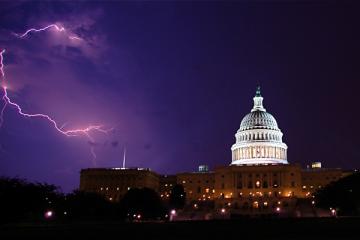Americans more than twice as likely to blame federal government than Wall Street for economic woes

As Occupy Wall Street supporters seek to gain more traction for their movement to challenge the nation's biggest financial institutions, a new Gallup survey finds that Americans are more than twice as likely to blame the federal government for the poor U.S. economy than its financial intitutions by a margin of 64% to 30%.
Gallup asked those surveyed the following question:
"If you had to choose, who do you blame more for the economic problems facing the United States-- [ROTATED: financial intitutions on Wall Street (or) the federal government in Washington]?"
The survey also found that there's plenty of blame for both financial institutions and the federal government. Conducted on October 15-16 of 1026 adults in all 50 states, the USA Today/Gallup poll additionally asked Americans how much they blame the federal government for the economy and, separately, how much they blame Wall Street's financial institutions.
In both cases, sentiment demonstrated that Americans believe both federal and banking entities are "A great deal" to blame for the economy. However, blaming the federal government in Washington "A great deal" exceeded blaming the Wall Street's financial intitutions by 11 points- 56% to 45%. As expected, those affiliated with the Occupy Wall Street movement placed more blame on financial institutions, while those affiliated with the Tea Party believed the federal government to be largely responsible for current circumstances.
It's noteworthy that assigning blame to the federal government is still the more strongly held belief in this latest round of measuring public opinion. In fact, it's quite telling of the electorate. To put it another way, what seems to remain at the core of the economic crisis is an entrenched skepticism toward federal representatives. This confirms the perpetually low approval ratings for both the legislative and executive branches of government in a number of recent polls.
In the end, I would argue that the competing views of movements like the Tea Party and Occupy Wall Street are a good thing, because they prompt a critical discussion. These distinct movements force Americans to answer one key question: What exactly is the legitimate role of the federal government in dealing with the US economy?



